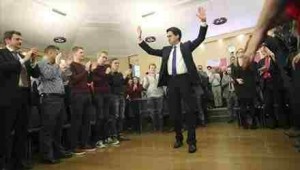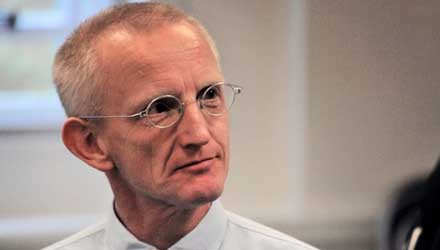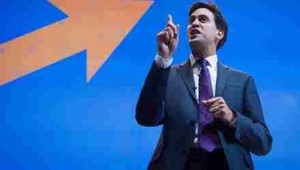The stench of leader loyalty hangs over the Collins proposals to ‘mend’ Labour’s trade union link, writes Stan Keable of Labour Party Marxists
Lord Collins’s proposals, to be put before delegates to Labour’s March 1 special conference, will not end the party’s trade union link, as the Blairite Progress faction would like, but they are the thin end of the wedge, and should be rejected outright. They have nothing to do with transforming Labour into a genuine party of the working class, for socialism rather than the illusion of ‘responsible capitalism’.
Where we need to break the domination of the union and party bureaucracy over the workers’ movement, Collins’s proposals are a rotten compromise made behind our backs – leaving the bureaucracies in control. Effective defence of the link requires a thoroughgoing democratisation and politicisation of both party and unions, and a fight to win all trade unions and all socialist organisations to affiliate to the party, making Labour a permanent united front of the whole class.
Although, under the proposals, trade unions at present affiliated will retain their 12 guaranteed seats on the national executive committee and their 50% vote at conference, as insisted upon by Unite in its December submission to Collins, the five-year transition to ‘opting in’ will do its work of culling the affiliated membership (and affiliation fees), setting the scene for a further undermining of the collective political input of trade unionists.
The proposal is that, from the end of 2014, new union members who wish to have part of their union dues paid to the party will have to opt in, rather than being automatically affiliated with the right to opt out. Existing Labour Link members will have to opt in within five years if they wish to continue paying the political levy to Labour. Then, those affiliated members who wish to participate in Labour Party matters can choose to be “associate members” of the party, and get to vote in party leader and deputy leader elections, among other things. Levy payers who do not choose to become associate party members will lose their present right to vote. Significantly, the party will have direct contact with the associate members, not via their trade union as at present.
According to Jon Lansman, proposals “seen as the basis for … agreement between Ed Miliband and the trade unions” were circulated for discussion by the Campaign for Labour Party Democracy. The CLPD proposals involved “Meeting Ed Miliband’s aspiration” to impose individual opting in to affiliated membership, and “Meeting trade union aspirations for a continuing collective voice in the affairs of the party they founded, and sustainable levels of voting and representation.”1However a February 3 blog comment by CLPD secretary Peter Willsman clearly condemns the opting in system:
“In 1927, as a vindictive response to the General Strike, the Tories brought in opting in, in order to weaken the Labour Party and undermine the influence within the LP of the organised working class. In 1946 the Labour government repealed this anti-working class legislation. The Tories have always wanted to bring it back and, no doubt, so have many in the misnomer organisation which calls itself ‘Progress’. Sadly, what is being proposed is closer to the Tories in 1927 than Labour in 1946. CLPD will be sending a critique to CLPs, with suggestions (to be sent to Ed) that would make the proposals less of a gift for ‘Progress’. But, if the sham ‘consultation’ is anything to go by, Ed has a tin ear.”2
In my view, the right to opt out of the union’s political fund is a legally imposed right to scab, which should be overthrown, along with all anti-trade union laws.
The whole process of the Collins review has been an insult to democracy, to rank-and-file party members and trade unionists, and to the NEC. After 13 years of tolerating the packing of constituency selection meetings by Progress, a shadowy rightwing organisation heavily funded by Lord Sainsbury, Ed Miliband used the Tory media frenzy over Unite’s mobilisation of trade unionists in Falkirk to announce his project to refashion the party – without first consulting the NEC, which had to play catch-up. Then, instead of submitting concrete proposals to annual conference, the “spring conference” was announced to pre-date and circumvent the annual autumn trade union conferences, removing their opportunity to debate the proposals and submit their own alternatives.
Collins, in his “interim report”, then invited submissions along the lines of ‘How do you think we can fulfil Ed’s vision?’, up to the Christmas Eve deadline, after which he could cherry-pick the suggestions he (or Miliband) prefers. Party organisations and affiliates met for collective discussion, but with no concrete proposals before them which they could amend. When the Collins report was finally circulated to the NEC immediately before its February 4 meeting, it did not even contain a summary of the content of the submissions. What did the party tell Collins? We do not know.
So why don’t NEC members speak out against this travesty of democracy? Jon Lansman explains:
“If you follow LabourList, you will have seen in recent days arguments from front-benchers on right and left who are privately unhappy about key aspects of the Collins proposals as to why you should nevertheless back them. Be not persuaded by the arguments ritually presented by those who depend on the patronage of the leader! This is not free expression! This is merely a requirement of their position.”3
So there is another item for the CLPD to tack on to its list of demands aimed at democratising the party: Abolish the post of leader, and let us apply some republican democracy to the party: eg, all officials electable and recallable; all officials on a skilled worker’s wage.
Notes
1. ‘Labour’s reshuffle – and what it means for party reform’ Left FuturesOctober 8: www.leftfutures.org/2013/10/labours-reshuffle-and-what-it-means-for-party-reform.
2. ‘Seven reasons to be wary of the Collins proposals’ Left FuturesFebruary 3: www.leftfutures.org/2014/02/seven-reasons-to-be-wary-of-the-collins-proposals.
3. Ibid.









